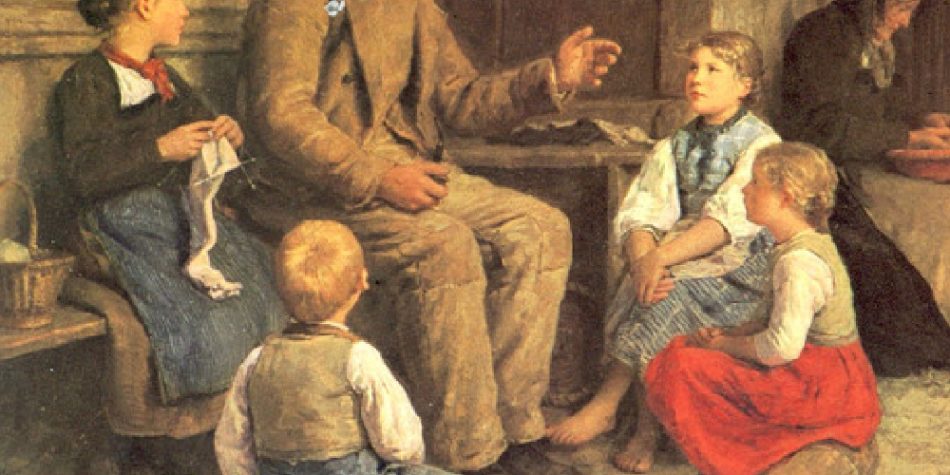I recently had knee surgery, and the experience was a reminder that the stories we tell ourselves are potent motivators. More importantly, they are almost always, to some degree, wrong.
Prior to the procedure, I hobbled around for nearly a year, going to physical therapy and exercising patience as I waited for it to heal. The story I told myself, “it will heal over time on its own,” was reinforced by well-meaning notions that sounded noble. But when my physical therapist, somewhat exasperated, said, “I’m not a miracle worker,” I was presented with an opportunity to adjust my story.
Who said I was asking for a miracle? Why would the physical therapist say that?
Her blunt observation was a catalyst for snapping me from the complacency of my own taken-for-granted story. Yet I was tempted to feel offended, which can sometimes prick us just enough to get our attention and likewise challenge the stories we tell ourselves.
Sometimes that frustration hits very close to home on matters far more important than knee injuries. Many among us navigate a range of experiences regarding gender, identity, and sexuality. In our natural efforts to understand and make sense of things, we tell ourselves stories—well-meaning narratives that almost always sound noble. We can’t out-love God. No matter how validating we might make as allies, it cannot beat the love heaven can provide.
For the sake of my knee, my story had to change. For healing to really take place, my knee needed surgery, guided by the precise and meticulous expertise of a skilled surgeon. I believe our stories regarding gender, identity, and sexuality deserve the same kind of careful scrutiny—and in some cases, perhaps some deep and courageous repairs too.
I’m thinking especially about three popular themes that come up repeatedly in our common discussions about these topics—each representing a particular story. Namely:
- “I want to be loving.”
- “It’s not my place to judge.”
- “I feel bad for them.”
Story #1: I want to be loving
How often have we heard that real love is unconditional? That it isn’t transactional, nor should it ask anything. From this vantage point, unconditional love is a kind of absolute acceptance that proves us free of bigotry, prejudice, or self-loathing. By adopting “love-just-love” or a myriad of other hashtag doctrines, we’re assured that we will never be the reason another suffers from shame, lack of validation, or feels left outside a family circle.
LOVE is a big word, no doubt—with a lot weighing on it. But we casually use it to describe pizza, a favorite movie, and our new pair of shoes. Then just as readily, we claim it to express a testimony of God and devotion to a spouse. So, there’s a lot of “wiggy space” for misunderstanding when it comes to “love.” Compounding our confusion, the connotations of popular hashtags and soundbites hijack the sacred. We find ourselves, not unlike the masses wandering at the base of the Babel tower, with the same vocabulary but very different dictionaries.
We might just need a new and clearer story about love to challenge the one we keep hearing. Like the surgeon with my knee, perhaps some precision of language will help. As President Russell M Nelson has taught: “While divine love can be called perfect, infinite, enduring, and universal, it cannot correctly be characterized as unconditional.” He then explained, “The word does not appear in the scriptures. On the other hand, many verses affirm that the higher levels of love the Father and the Son feel for each of us—and certain divine blessings stemming from that love—are conditional.”
That’s a dirty word for many today—signaling fake and instrumental love that some grow up feeling in their homes: “I love you as long as you do this.” But that’s not what this is referring to. God does love us—no matter what. That is true and unchanging. And (not but), our actions matter. There are some things, some feelings, and some manifestations of love that God cannot give us without a certain kind of willingness to yield on our part.
If so, then what can help us cultivate that kind of willingness to yield? Religion and faith practice—that’s what. In fact, we have learned that religion plays a positive factor in increased mental health benefits and outcomes for teens, even those working through gender/identity experiences. As clinician Jeff Bennion has summarized, “These findings are consistent with other research showing the positive and protective mental health benefits to religious observance. Of course, we are talking about statistical trends, and obviously, this doesn’t mean that every LGBT+ individual has a wonderful, positive experience of faith.” He goes on to note that the data confirms a trend moving in both directions, “In fact, this evidence confirms irreligious LGBT+ are more likely to be more unhappy too.”
In my view, these findings speak to the fact that we can’t “outlove” God. No matter how loving and validating we might be in an effort to be allies, it cannot beat the love and validation our Heavenly Parents and the Savior Himself can provide.
That helps explain why “the first commandment [is] first” as an “overarching priority,” as Elder D. Todd Christofferson elaborates:
We enhance our love by anchoring it in divine purpose and power. It means that we have the Holy Ghost to inspire us in ways to reach out that we would never have seen on our own. Our love of God elevates our ability to love others more fully and perfectly because we in essence partner with God in the care of His children.
It helps us avoid “unbridled compassion” that could lead us to question God’s justice and mercy. Jesus Christ has famously and repeatedly warned of hearts “failing” people in the last days when the “whole earth is in commotion.” Without both justice and mercy applied to our love, our hearts alone would, indeed, fail us.
The surgical fix for our first oversimplified story centered on our desire to be loving might be recognizing: I can discern between divine love and counterfeit love.
Story #2: It’s not my place to judge
Clearly, none of us are perfect or in a position to cast stones. When it comes to judging, Elder Dieter Uchtdorf said it plain enough, “Stop it.” Christ dined with sinners, so ‘what does it matter how someone else is living their truth?’ we might understandably ask. Who does it harm to just live and let live? It’s not my place to judge, anyway—and besides, don’t they have a right to receive their own revelation? “The truth is we all feel like square pegs at one time or another.”
Judgment, in some sense, is inescapable—something we do instinctively. For instance, it takes a whole tenth of a second to make up our minds on first impressions. One of those traits we judge so irresistibly is trustworthiness. So not only is it natural to judge, but like in this case, we use it as an important survival skill. Thankfully, with wise encouragement given anciently, we can learn a “way to judge” that is godly:
For behold, my brethren, it is given unto you to judge, that ye may know good from evil; and the way to judge is as plain, that ye may know with a perfect knowledge, as the daylight is from the dark night. For behold … I show unto you the way to judge; for everything which inviteth to do good, and to persuade to believe in Christ … is of God. But whatsoever thing persuadeth men to do evil, and believe not in Christ … it is of the devil” (emphasis my own).
Notice that the way to judge is clear as night and day, given to every person, and even comes with a promise of perfect knowledge. Recognize we’re not being told here not to judge, but how. Similarly, Jesus taught his early disciples:
Beware of false prophets, which come to you in sheep’s clothing, but inwardly they are ravening wolves. Ye shall know them by their fruits. Do men gather grapes of thorns, or figs of thistles? Even so every good tree bringeth forth good fruit; but a corrupt tree bringeth forth evil fruit. A good tree cannot bring forth evil fruit, neither can a corrupt tree bring forth good fruit. Every tree that bringeth not forth good fruit is hewn down, and cast into the fire. Wherefore by their fruits ye shall know them.
Fruits don’t grow overnight. But we can constructively observe the longer-term impact of individual teachings, philosophies, and trends and judge for ourselves whether they invite us to follow Jesus’s higher path of covenant-making and keeping—or, alternatively, whether they lead us in dangerous ways.
“Anti-Christ” is defined in our faith as “anyone or anything that counterfeits the true gospel plan of salvation and that openly or secretly opposes Christ.” While citing Lucifer as the “great antichrist,” this explanation draws attention to “many assistants, both spirit beings and mortals.” Alongside the many examples in scripture, if we are careful, we can identify and accurately judge those that exist today.
Social media is filled with opportunities to examine the fruits of the Influencer Gospel. So often, even those who market themselves as faith-related are not really increasing faith. Amanda Freebairn recently raised many ideas for discerning the impact of influencers—cautioning believers that when they “give some of these voices too much authority, their worldviews are slowly warped in ways that are not consistent with the gospel.” She goes on to note that even when content creators intend to strengthen faith, they can be especially “susceptible to secular worldviews” given their strong motivation to be popular. That’s what makes President Nelson’s warning so timely:
If most of the information one gets comes from social or other media, the ability to hear the whisperings of the Spirit will be diminished. … Even Saints who are otherwise faithful can be derailed by the steady beat of Babylon’s band.
With more meticulous attention to the actual (and inescapable) judgments we make, this second story could be adjusted to more accurately become: I can judge “the fruits,” not the person.
Story #3: I just feel bad for “them”
Such a host of ideas confirms this last story of affirmation and attempted validation. Both of these have increasingly become activist terms, often used in ironically politicized, divisive ways. These stories of affirmation begin with something like, I just feel so bad for them; it’s not like they can change. Their struggle is so unique I can’t even relate to them. They aren’t like other single members; they have no hope of ever being married. There’s a common denominator in this narrative—it’s them, as in us and them.
I’ll never forget sitting in a fireside where the speaker ended the presentation by showing a picture on the screen of a square peg being hammered into a round hole. I had a visceral reaction to the image and the words that accompanied it. I remember thinking, “You just said to everyone here who feels different—yes, you are! You confirmed for anyone who thinks the Church is against them that, well, it is! For anyone who believes they don’t fit in the plan, so they need to just leave—you’re saying, you’re right. And sadly for many, the balance of that thought is, “And when you leave, I’ll leave with you.”
Everything about that message screams the opposite of discipleship and divides us into camps and labels. Underneath the warmish tone, what it actually did was affirm “othering” and made me sad. I wanted to stand up and say, “The truth is we all feel like square pegs at one time or another. We are all broken and splintered. We are all vulnerable to ways that Satan exploits our pain.”
I wanted to say, to anyone there, “You fit because none of us are perfect as we are. We are all incomplete, undeveloped, a work in progress—and in aching need of a Savior.” And that’s exactly the point we should be emphasizing: How our potential is expanded in identifying as His. Limiting labels prescribe us to tribes that will pass away like mist in the eternities. Rather than splicing people into subgroups of various poor-fitting pegs, we can seek out and listen to those that describe us with permanent characteristics matching our identity and purpose as a son or daughter of God. Limiting labels prescribe us to tribes that will pass away like mist in the eternities.
Christ’s invitation is for all. His invitation appeals to our potential without limiting our possibilities and dividing them and us. To follow his example of “meeting them where they are” means we need to include an invitation to participate in the fullness of His gospel. A bigotry of low expectations can hold us back from seeing ourselves or others as capable or needing the fullness of the gospel. Clark Gilbert teaches how we can avoid this bigotry and reassures us that “In the Lord’s timing, it is not where we start but where we are headed that matters most.”
This means any of us, at any point, can course-correct toward our heavenly home. We can tell a different story.
If we affirm anything, let it be healing.
And God’s divine love.
And discernment rather than judgment.
Our stories can change–for the better.

















